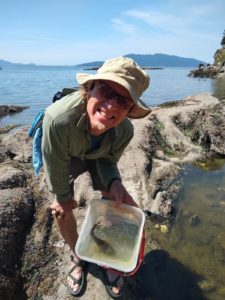Heather, one of RE Sources’ trusty volunteers, was pondering the meaning of it all on a sunny Friday afternoon at the Larrabee State Park beach. Heather is a Beach Steward, part of our North Sound Stewards community science program. She spends some afternoons each summer amid the height of visitor season at Whatcom County’s popular beaches, helping beachgoers identify critters they find, talking about the importance of marine ecosystems, and giving tips on how to treat these places with care.
As she nursed a coffee and meandered the tidepools, chatting with tourists and locals alike, Heather saw something that gave her pause. Without totally giving away the moral of the story, it reminded her (and us) why it’s so valuable to give people a chance to learn about the living places we visit — a trip to the beach becomes so much more.
Here’s Heather’s experience:
“When I headed out to Larrabee to volunteer today, I wasn’t even sure that I would throw on my orange vest and play the role. I was wandering around the tidepools, and wondering if all the effort really made a difference. Eventually, I dug into the bag and wrapped myself in a vest and a smile. Tidal species ID guides in hand, I plunged into the usual string of interactions; joining with people in their enthusiasm and letting them know what tidal wildlife they’re looking at, explaining my role as a RE Sources volunteer, and how we can love the beach without loving it to death.
Three hours later, I was quietly approached by some visitors concerned with some behavior they thought might harm the wildlife. Some enthusiastic and well-intentioned kids had found what would prove to be a female midshipman fish in the mud under a rock. They were reveling in their discovery, passing the fish from one set of hands to the next, and decided the fish would be far better off in a nice, wet tidepool instead of the hot mud.
What happened to the midshipman fish?
When I climbed to the highest possible tidepool and asked nearby kids what cool things they were finding, I was quickly directed to the huge fish and invited to handle it. I suggested that since the fish had already been handled quite a bit, that I was going to take some ID pictures instead. We got to talking about why midshipman fish choose larger rocks for egg-laying and how they often live in wet mud because they are so well adapted to low-oxygen environments. We drew a small crowd of curious kids and adults — it was a perfect chance to impart some practical beach etiquette, like not moving animals from one intertidal zone to another. Intertidal zones, parts of our beaches that are underwater during parts of the day and exposed to the open air at others, are fascinating places full of niches, nooks and crannies. Critters like fish, crustaceans and other invertebrates are each uniquely adapted to inhabit particular zones — some higher and dryer, some lower and wetter. We also talked about not turning over rocks much larger than your head, returning rocks exactly as found, and some guidelines for when and when not to touch animals.

We considered out loud if we should just leave the stressed out fish in that tidepool, or if we should move it once again back to its correct intertidal zone. I wasn’t even entirely sure myself. I saw some folks with buckets, unaware of our quandary but slowly making their way to us. Eventually the kids moved on, and I looked up to see a man in front of me with a large enough container for the job. He was familiar with RE Sources and Beach Stewards, so I shared the situation and asked if his bucket could be put to work. It turns out the man was Doug Stark, who was my catalyst from years ago that led to me joining this volunteer program in the first place. He confirmed that relocating the fish was a sound judgement call.
Although we could not find the original kids to have them personally participate in the final leg of their adventure, their teachable attitudes, critical thinking, and enthusiasm left me reassured that a pool of future beach stewards would carry the torch (or the bucket). I went on to have several more good conversations about barnacle genitalia, raccoon feces, and baby crabs. I finally left Wildcat Cove feeling like the hours and effort has been more than worth it.”
Want to be a Beach Steward or another community science project? Get email updates for our North Sound Stewards program and make a real difference for local waterways!
